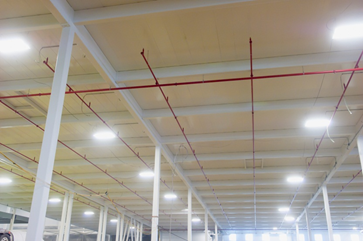HSS Provides Sanitary Design for Food Processing Manufacturing Plants
 In 2011, Atlas Tube partnered with a food processing manufacturer to build a state-of-the art $250 million manufacturing plant in Topeka, Kansas, using hollow structural sections (HSS).
In 2011, Atlas Tube partnered with a food processing manufacturer to build a state-of-the art $250 million manufacturing plant in Topeka, Kansas, using hollow structural sections (HSS).
Challenge: Plant sanitation, safety, quality and operations
Per Food and Drug Administration guidelines, the construction manager needed a structure that prevented bacteria from collecting in inaccessible area—a critical consideration specific to food and beverage manufacturing plants.
The ultimate goal of this project was to design and build in features that protect the food product from contamination. Horizontal surfaces on framing members and exposed bolted connections were not viable options for the construction manager’s vision.
Approach: Hollow Structural Sections
To ensure adequate sanitation, food and beverage manufacturing facilities must be designed and constructed with sanitary design principles in mind. HSS closed connections were the optimal choice for this project, due to HSS properties such as: uniform shape, less surface area than open sections, resistance to dry rot, mildew, termites and carpenter ants.
Alternatives to HSS were considered (wide flange members with shop- or field-attached skirt plates, built-up box sections with steel plates, etc.), but called for higher fabrication costs.
Result: Affordable, Clean design Achieved
A clean, sanitary facility has hard, flat and smooth surfaces, free of cracks and crevices; HSS were the obvious choice based on project requirements and properties of HSS. Throughout the project, HSS members of all sizes up to 20×12 were utilized for columns, roof purlins, floor purlins and process platform framing.
